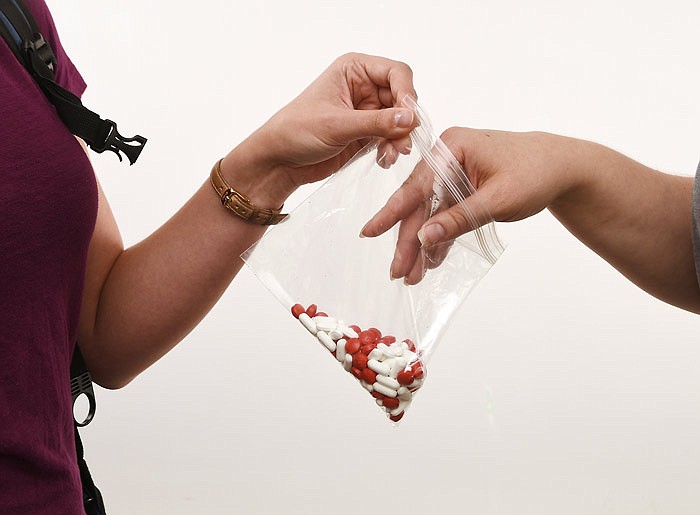Out-of-school suspensions at Jefferson City Public Schools spiked last year, in part because the district is combating a growing drug problem among its students, school officials say.
The total drug offenses for the 2014-15 school year was 64 - 41 of which resulted in suspensions for 10 or more days. The year before, students districtwide were suspended for the same offense and duration only 15 times.
Drug and alcohol offenses automatically result in out-of-school suspension, which explains, in part, why lengthy out-of-school suspensions went from 80 in 2014 to 177 in 2015.
In 2015, there were 178 instances of in-school and out-of-school suspension for 10 consecutive days. Seventeen incidents resulted in suspensions of more than 10 days, according to data collected by the Department of Elementary and Secondary Education.
The rate of drug and alcohol offenses at the district is slightly higher than the state average, as is the rate for out-of-school suspensions.
Some of the other suspensions are a result of an accumulation of discipline problems. One of the highest-reported behavior problems at the district is disrespectful behavior toward staff, which wouldn't automatically result in a suspension, but it could snowball into one.
"A disruption in itself is not a 10-day suspension," said Superintendent Larry Linthacum. "It's just like if you speed 17 times going 17 miles an hour over the speed limit and then on the 18th time you spend a night in jail versus getting a ticket. It's a progression."
In 2015, there were 195 suspensions - in-school or out-of-school - that were at least 10 consecutive days, up 91 from the previous year, according to DESE. Out of the 195 suspensions, 147 of them were at Simonsen Ninth Grade Center and the Jefferson City High School.
The total suspensions for in-school and out-of-school was 2,853 - the majority of which were in-school, according to data provided by the district.
Out-of-school suspension is a last resort, said Tammy Ridgeway, assistant superintendent for secondary education. Administrators turn to in-school suspension, detention or other methods before suspending a student out-of-school.
Coming to school under the influence or possessing drugs or alcohol on school grounds is considered a major offense, which results in being suspended out-of-school for at least 10 days - repeat offenders could be suspended for longer.
"To be honest, we've tried - and we still have a lot of work to do - we've tried tightening up on discipline," Ridgeway said. "We want kids to be in school. The bottom line is we want to educate them and want them to graduate and be part of the strong workforce in Jeff City or across the state, but there are lines just like when you get so many tickets and they take your driver's license."
Ridgeway said the district noticed a rising trend of drug use in the community.
Students are mainly caught under the influence or in possession of marijuana, which Ridgeway said reflects a community issue that's spilling into the schools. For the past two years, the district has partnered with the Council for Drug Free Youth and the Boys & Girls Club to offer drug interventions for students.
The students or parents who opt for the intervention program enlist in it for 10 days then return to school. A key component of the program is parents attend it with their children, Ridgeway said. Having an intervention program is an important part of battling the issue, and it's free to those who attend.
If students opt out of the intervention program, then they participate in an after-school program for 2 1/2 hours Monday through Thursday for 45 days.
Students who are suspended for 10 days or fewer can do all of their assignments at home, and with improved technology, a lot of their school work is online.
Discipline is a priority next year, said Superintendent Larry Linthacum, and combating drugs and alcohol is part of that.
"We're trying to develop relationships with them, and they may have challenging solutions at home that we have to work with them on," he said. "It's not like we're trying to kick kids out of school. But there's a line in the sand, and if they cross it, there are consequences. We're trying to take an active role with these kids and engage them."
The district's behavior task force is working to create aligned systems for dealing with discipline so disciplinary action is consistent. Having clear classroom and building expectations hopefully will lessen the offenses, officials said. The district has also hired specialists to work with teachers and students to determine the root of the issue.
Officials will continue to evaluate the effectiveness of out-of-school suspensions, but Ridgeway and Linthacum maintain while it's not ideal, sometimes it's necessary.
The drawback for the district is it isn't paid for students who aren't attending class. School districts are funded based on their average daily attendance, so students who are suspended won't count toward the district's revenue.
"There's a dollar figure on that," Linthacum said. "But if you keep every kid in school because of the money, what's it going to do for the learning environment and culture on kids and staff? There's an opportunity cost both directions."


